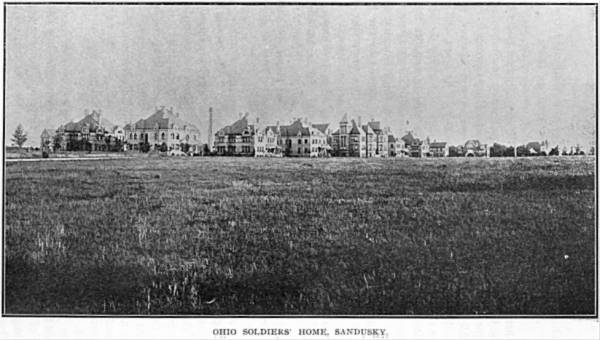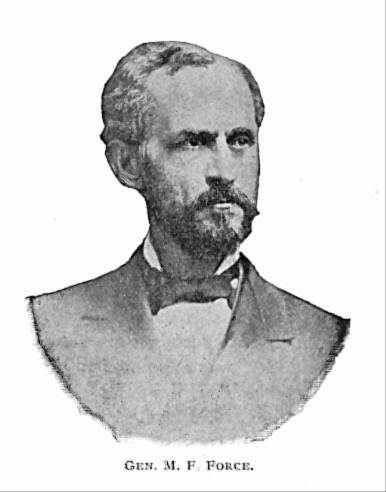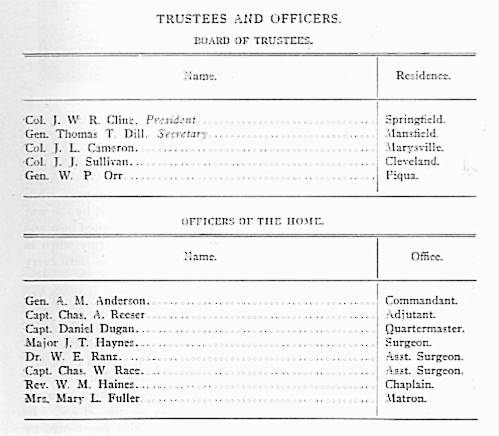TO provide for the establishment of this institution the General Assembly passed the following act April 30, 1886:
Be it enacted by the General Assembly of the State of Ohio. That there shall be established in this state an institution under the name of the 'The Ohio Soldiers' and Sailors' Home,' which institution shall be a home for honorably discharged soldiers, sailors and marines."
"All honorably discharged soldiers, sailors and marines, who have served the United States government in any of its wars, and who are citizens of Ohio one year preceding the date of making the application for admission to the Home, and are not able to support themselves, and are not entitled to admission to the National Military Homes, or cannot gain admission thereto, may be admitted to the Home first aforesaid, under such rules and regulations as may be adopted by the Board of Trustees hereinafter provided for; provided that preference shall be given to persons who served in Ohio military organizations."
House Bill No. 125, passed February 19, 1892 provides:
SEC. 2. That no insane or imbecile person shall be admitted to the Home * * * If any insane or imbecile person, through misrepresentation as to his condition, shall be sent to said Home, he shall be returned to the county whence he came, and the expense of such return be borne by the county whence he came.
To carry out the provision of the act, Governor Foraker, in April, 1886, appointe as trustees Hon. Isaac F. Mack, R. B. Brown, Thos. G. Dill, Wm. P. Orr and Thos B. Paxton. Th board organized on June 3, and elected I. F. Mack president, and R. B. Brown secretary. During the summer a number of places were visited and carefully looked over. A site three miles from Sandusky was finally selected as the best place to locate the Home. H. S. Lindsey, of Zanesville, was chosen architect, and he at once prepared plans for the buildings. Herman Haerline, of Cincinnati, was employed as landscape gardner, and and the work of improvement of grounds and construction of buildings was at once commenced.
On July 11, 1888, the cornerstone of the administration building was laid by Judge O'Neill, Commander of the Department of Ohio Grand Army of the Republic, in the presence of Governor Foraker and a large assemblage of Ohio citizens. In the fall of 1888, the trustees appointed the following officers: General M. F. Force, of Cincinnati, Commandant; Capt. A. M. Anderson, Delaware, OH., Adjutant; Col. E. J. Blount, Cincinnati, O., Quartermaster; Dr. S. C. Rannells, Vinton county, Surgeon; Mrs. Sarah J. Price, Mansfield, O., Matron, who entered upon the discharge of their duties in October, and the Home was opened on November 19, with seventeen members. The annual report for the year ending November 15, 1889, shows that 716 men had been admitted during the first year.

In June, 1890, Trustee Thos. T. Dill was appointed Assistant Adjutant General and resigned as trustee, being succeeded by J. F. Charlesworth, of Belmont county, and during the summer of 1890, Peter Brady, of Sandusky county was appointed trustee vice I. F. Mack, resigned.
In December, 1890, a change was made in the official family of the Home by the appointment of Maj. D. T. Cockerill, of Brown county, as Adjutant; Capt. Daniel Dugan, Zanesville, Quartermaster, and Dr. J. N. Mowry, Mansfield, Surgeon, who was succeeded in September following by Dr. John T. Haynes.
During the year of 1892, Capt. J. L. Cameron, of Marysville, succeeded Peter Brady, and J. J. Sullivan, of Cleveland, succeeded J. C. Charlesworth as Trustee. Capt. A. M. Anderson was reappointed as Adjutant, and Dr. E. N. Heard, of Cincinnati, was appointed Assistant Surgeon. Average number present during 1892 was 762. During the summer of 1893, Rev. Thomas J. Sheppard was appointed Chaplain of the Home at a salary of $1,000, and remained until September, 1897, when he was succeeded by Rev. W. M. Haines of Union county, and Judge H. D. Peck succeeded Thomas B. Paxton as trustee. Average number present during 1893, was 819.
In 1894, Mrs. Sarah J. Price resigned her office as matron and Mrs. Mary Le Fuller, of Sandusky, was appointed to the vacancy.
In 1896, General Thomas T. Dill was appointed trustee vice judge H. D. Peck, resigned and R. D. Burnham succeeded E. N. Heard as Assistant Surgeon.
In March, 1898, Col. R. B. Brown, after twelve years continuous service as a member of the Board of Trustees, resigned the office and Col. J. W. R. Cline, of Springfield, was appointed to fill the vacancy.
On May 8, 1899, the state and the Home sustained a great loss in the death of Gen. M. F. Force, the Commandant. The Board of Trustees ordered spread upon the minutes the following testimonial on his death:
"This Board will leave to others the task of writing suitable obituary for the distinguished dead, but we desire to preserve on our own records some testimonial of our appreciation of the eminent services rendered by Gen. Force for this institution, he was indeed the father of the Home.
"General Force had achieved renown as a soldier and jurist before being called upon to assume the great responsibility of organizing this Home and placing it as we all desired, first among the soldiers' homes of this nation.
"By unanimous voice of the Board he was tendered the position of Commandant before the Home was opened. He accepted the responsibility and became with his devoted wife to prepare for the reception of those who should seek the support and protection of the institution, and as he often expressed it, not to make a military camp, but a home for his unfortunate comrades. His high character and intelligent zeal insured success from the first.
"With him charity and kindness went hand in hand with judgment and discipline. He was ever ready to hear the most humble petition, and while keeping up a high moral standard for the Home he loved and encouraged the weak and unfortunate.
"His resourceful mind gave to the Home steady improvement, and his spotless life protected it from scandal. His zeal and devotion were unbounded, and it was a merciful Providence that permitted him to live to see the full fruition of his hopes, and to be comforted by the assurance of the national inspector that the Home of which he was commandant had found first place among the homes of the land.

"We shall miss him at our Board meetings, and wait in vain for him in our councils, but we shall cherish his memory with love and gratitude.
"To Mrs. Force and her son we extend our profound sympathy and assure them that wherever they may go they will bear with them the best wishes of every members of this Board."
At the meeting of the Board on May 17, Capt. A. M. Anderson was appointed Commandant, and C. A. Reeser, of Springfield, was appointed Adjutant.
The first of January, 1899, found the new hospital completed, which gives the Home the most complete structure of its kind of any institution in the country. Seven trained lady nurses were employed to look after and care for the sick and suffering old me. Two years' experience has shown that these ladies have added wonderfully to the comfort and welfare of the sick.
The Home started in on the new century with an overcrowded house. Number present, January 15, 1,391; on the rolls, 1,621; average number present for the year ending November 15, 1900, 1,261; cost per capita for current expense, clothing, officers' salaries and trustees' expenses, $151.15; of which the general government pays $100.00, leaving a cost to the state of only $51.15 per annum to comfortably house, clothe, feed and give medical attention to these old soldiers. Since the Home was opened in November, 1888, forty-eight hundred and eighty-five (4885) men have been admitted and cared for. The Home is largely indebted to the Grand Army of the republic and the Womans' Relief Corps for generous donations of books, magazines and papers for the library, and hospital supplies of jellies, fruits, cushions and other articles.
The entire cost of building and permanent improvements amount to #657,863.72.
